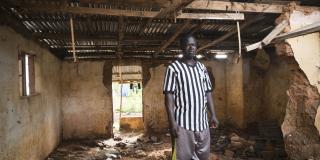
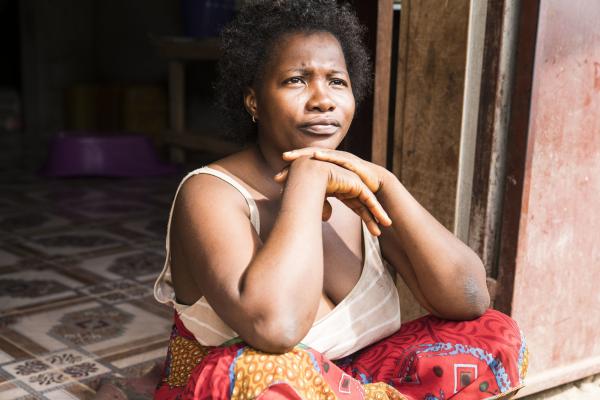
A mudslide and severe flooding struck Sierra Leone’s capital, Freetown, last August, killing hundreds and leaving thousands homeless. While the rest of the world has moved on, Sierra Leoneans are still trying to recover, writes Deborah Torr. One year on, how can we prevent such a tragedy from happening again?
“In years to come I will sit with my children and explain the story to them of the loss of their father.”
On 14 August 2017, Sento Timbo found herself caught up in Sierra Leone’s first mudslide in over 70 years. In a matter of seconds, the rock face of Freetown’s Mt. Sugarloaf collapsed. The disaster caught the tens of thousands of people living in its shadow unawares.
“I was at home with my family when the house started to flood. There was no way to escape. My husband rescued my daughter and I, and then went to find our youngest son, Shaku.”
After several hours, her husband had still not returned. “By this point I thought I had lost both my husband and my son.”
Then, after six hours, there was a sign of hope.
“A chicken was standing in the water. With our traditional beliefs, we found it significant that after all this destruction, a chicken had survived.”
“My one-month-old son, Shaku, was lying in the water, underneath the chicken. We didn’t know if he was dead or alive, so we took him to the doctor, and he was then transported to the main hospital. He was alive. It’s a mystery to me how he survived.”
Sento’s son Shaku is alive to this day, but she never saw her husband again.
“I lost my husband that day. Sometimes I have nightmares of my husband, or of the mudslide. When I am sitting quietly by myself, my memory will run back to that event.”
I keep imagining the mudslide will happen again.Sento Timbo
At 2am on Monday 14 August 2017, heavy rains began to fall, triggering a mudslide four hours later. That same day, volunteers began to move people to temporary accommodation where VSO provided items like clean water, soap, sanitary towels and clothes and helped to co-ordinate the different organisations responding to the disaster.
In the months following the mudslide, there was a secondary risk of infection and disease breaking out through poor hygiene. So, VSO volunteers spread information on hygiene best practice through an awareness campaign that reached 1,700 households, as well as cleaning 11 wells and installing 12 handwashing stations in primary schools.
In January, VSO started to turn its attention towards disaster risk reduction with the appointment of international volunteer Jonah Tendere from Zimbabwe, who in May, trained 75 volunteers in disaster management. These volunteers are now building local knowledge of hazards where they live.
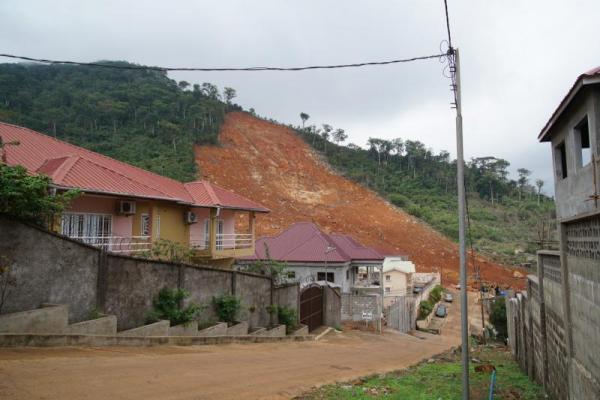
The devastation left behind
Sento recalls trying to put her life back together in the immediate aftermath of the mudslide.
“The day after the mudslide, the place was ungodly.”
Huge boulders had torn through several communities in a matter of minutes, dragging with them trees and rubble.
“Everyone was fighting to rescue people, find loved ones, lost property.”
In one night, more than 500 people died, and 11,000 people lost their homes, according to the Office of National Security. Sento was placed in a camp for months on end, alongside thousands of others, all with nowhere else to go.
“After the mudslide, VSO gave us soap, clean water, food, clothing, a place to sleep,” remembers Sento. “At that time, all the water in the area was polluted. VSO volunteers taught us about hygiene, and gave us water that was pure and safe to drink.”
“Now we are approaching the rainy season, and it's a bitter experience. I keep imagining that the mudslide will happen again. It’s left me with memories I can't forget – every drop of rain that falls, I am scared. When it rains, I can't sleep.”
Alpha Kamara, 36, had both his home and his livelihood taken away from him, making it impossible to care for his family.
“My wife used to work as a domestic trader, and all her goods were kept in this house. I was also a skilled worker, but now all my tools I worked with to get income have gone.
“That day a lot of lives and property were lost. I thank god that me and my family were able to survive, but all of our property was gone and our house was broken. It left me devastated.”
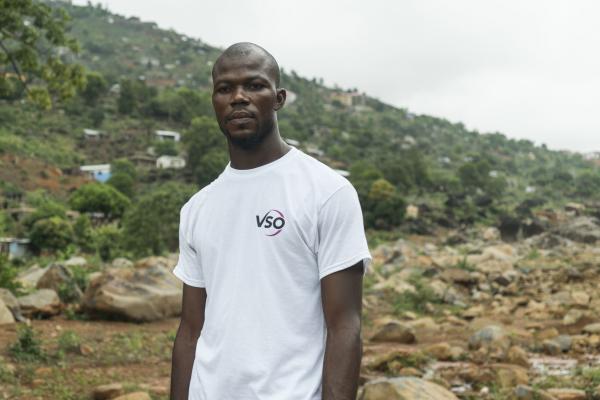
Picking up the pieces
Freetown is known for its heavy rains, tropical climate and vulnerability to flooding. At the height of the rainy season, in August, Sierra Leone’s capital sees an average of 539.9mm of rainfall. However, a combination of increased construction on hillsides, illegal rock mining and the clearing of forest has made in the city even more at risk of flooding and mudslides.
VSO volunteer Francis Kandeh, 29, shares Sento’s fears for the coming rainy season.
“People are still living at the base of this hill. These people can’t afford homes in safe and convenient places.”
Freetown has a housing deficit of 280,000 homes; so many people are living in poorly built homes made of no more than corrugated iron sheeting.
“I am scared that a mudslide will happen again.”
Francis was there the night of the mudslide last August, and saw first-hand the destruction it caused. He ran down to where the water had risen, and began to pull people, both dead and alive, from the water.
Volunteering gave me the courage to do what is rightFrancis KandehCommunity volunteer
Now, Francis is one of 75 volunteers alerting his community to actions that could trigger another disaster.
The Director of Disaster Management for Sierra Leone, John Rogers, has said that the mudslide was “both a natural and manmade disaster.” This means that curbing human activities could reduce the likelihood of another disaster.
“I’m meeting with community members to open a dialogue about harmful practices, like mining rocks, cutting down trees or building homes. These activities can make a mudslide more likely,” said Francis. Francis has been educating 500 community members in the Pentagon community on these dangerous activities, and has set up a disaster risk reduction club in his local school.
Paying with their lives
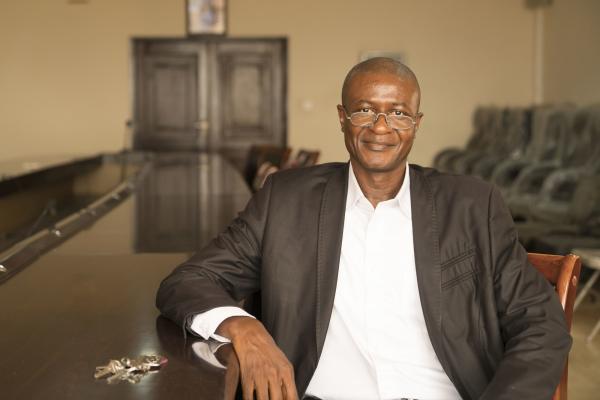
John Rogers, Sierra Leone's director of disaster management, is working with VSO to reduce the risk of another mudslide or disaster.
We’ve got to do all we can to reduce the likelihood of another disaster. Nevertheless, it is important Freetown is prepared for the worst.
Volunteers are teaching residents to recognise the early warning signs that a disaster is about to strike, such as watching for changes in the flight patterns of birds, the movement of animals and changes in the direction of wind.
All 75 VSO volunteers working in the community, many of whom live there, carry a disaster preparedness kit. Made up of a mobile phone, megaphone, a high-vis jacket, a whistle, training manuals and demonstration cards, it equips them to be ready to help in case of another catastrophe.
Simultaneously, VSO has equipped the Department of Disaster Management with technology like laptops, hard drives and internet modems, to keep track of any disaster-related issues as they unfold. Before, the office had ordinary computers, which weren’t capable of alerting the office in good time of an emergency. The office now aims to respond to any disaster within 72 hours.
John Rogers warns against thinking of the 2017 disaster as a one-off event.
“For the past fifteen years, we can't go a whole rainy season without flooding in Freetown.
“Sometimes I wake up in the middle of the night expecting a phone call to say that an event has happened in my city.”
Sierra Leone’s Office of National Security and the meteorological department has collaborated with VSO to make use of early warning systems that track changes to weather patterns through scientific equipment, such as wind vanes, rain gauges and a fire monitoring system.
In the last hundred years, natural disasters around the world have become increasingly common, with factors like climate change and urbanisation playing a role.
“The vision should be that this never happens again. It’s a very painful lesson to learn. We don't want this disaster to happen again in Sierra Leone, or in any other country on the globe.”
Developing countries are being hit hardest, lacking adequate resources to keep their citizens safe.
In Freetown, it’s people-power that’s making a real difference. The communities trust these volunteers, so when they make suggestions like disaster risk reduction clubs at school, or creating hazard maps of the local community, they are listened to.
One year on
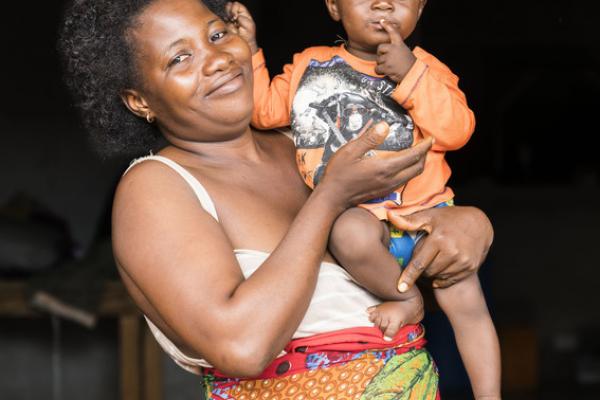
Sento Timbo with her one-year-old son Shaku. Sento wants her two children to have a good education, and for them to become lawyers or doctors.
It’s one year since the mudslide, and the rainy season is here again. Mt. Sugarloaf looms over those left behind in the valley below.
In Francis’ community, returning floodwaters have already destroyed a bridge connecting the village of Kaningo with the rest of Freetown – a reminder that disaster is an ongoing fact of life for residents here.
In the long term, Francis’ dream is to move people in danger out of harm’s way. “In five years’ time, I want everyone living in disaster-prone areas to be relocated to a safer place.”
International volunteer, Jonah Tendere, from Zimbabwe, understands the motivation for these local Sierra Leonean volunteers. “Sierra Leone is a country that has been under civil war, and then Ebola, and then the mudslide last year.
“Everyone has been involved in these traumatising incidents. I believe there's no better motivation than just being part of change, part of development, and you become part of a story.”
John Rogers has bright hopes for a Freetown “where people have respect for the environment, where we can come together and think ahead, making sure that we are secure and safe.”
Meanwhile, Sento’s son, who survived the mudslide against all odds, is now a happy, healthy one-year-old. But Sento fears not being able to provide for her growing family, as her late husband was the breadwinner of the family. Sento has no way to earn a living at the minute, and is squatting with relatives.
“I really want to give my children a better future and take good care of them. I want to go into business, so I can give them the best education. I want my children to grow up and have a better life.”
It’s likely that little Shaku will have to endure more disasters as he grows up. But with the continued efforts of volunteers working together to make his community more resilient, he and the next generation will inherit a safer Sierra Leone. They’ll be prepared for the worst, and have the best chance of escaping with their lives when another disaster hits.
The people of Freetown want basic things: they want to live without fear of disaster, they want to earn a living and they want to give their children a good education. Together, volunteers and supporters are helping bring this simple dream closer to reality.
Disaster preparedness is just one focus of our work in Sierra Leone, from doctors sharing life-saving skills to delivering clean running water to local health clinics. You can read more here:
Read more
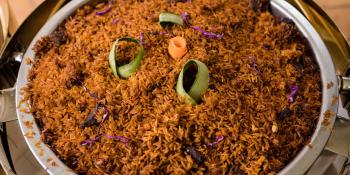
Kenyan beef pilau recipe
In this blog, some of our VSO family share their favourite mouth-watering recipes and highlight the work they’re doing to promote sustainable farming practices and healthy eating. Here is a recipe for Kenyan beef pilau from volunteer Fridah.
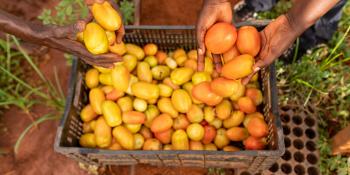
Bangladeshi tomato bhorta recipe
In this blog, some of our VSO family share their favourite mouth-watering recipes and highlight the work they’re doing to promote sustainable farming practices and healthy eating. Here is the Bangladeshi tomato bhorta inspired by Maleka’s vegetable garden.
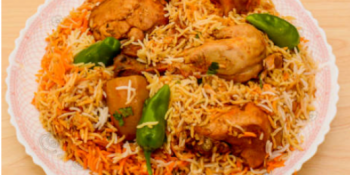
Pakistani chicken biryani recipe
In this blog, some of our VSO family share their favourite mouth-watering recipes and highlight the work they’re doing to promote sustainable farming practices and healthy eating. Here is Pakistani chicken biryani from volunteer Khajida.
